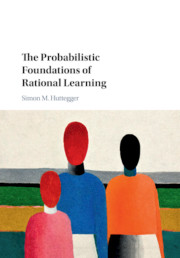Book contents
- Frontmatter
- Dedication
- Contents
- List of Figures
- Preface and Acknowledgments
- Introduction: Abstract Models of Learning
- 1 Consistency and Symmetry
- 2 Bounded Rationality
- 3 Pattern Learning
- 4 Large Worlds
- 5 Radical Probabilism
- 6 Reflection
- 7 Disagreement
- 8 Consensus
- Appendix A Inductive Logic
- Appendix B Partial Exchangeability
- Appendix C Marley's Axioms
- Bibliography
- Index
1 - Consistency and Symmetry
Published online by Cambridge University Press: 25 October 2017
- Frontmatter
- Dedication
- Contents
- List of Figures
- Preface and Acknowledgments
- Introduction: Abstract Models of Learning
- 1 Consistency and Symmetry
- 2 Bounded Rationality
- 3 Pattern Learning
- 4 Large Worlds
- 5 Radical Probabilism
- 6 Reflection
- 7 Disagreement
- 8 Consensus
- Appendix A Inductive Logic
- Appendix B Partial Exchangeability
- Appendix C Marley's Axioms
- Bibliography
- Index
Summary
From the theoretical,mathematical point of view, even the fact that the evaluation of probability expresses somebody's opinion is then irrelevant. It is purely a question of studying it and saying whether it is coherent or not; i.e., whether it is free of, or affected by, intrinsic contradictions. In the same way, in the logic of certainty one ascertains the correctness of the deductions but not the accuracy of the factual data assumed as premises.
Bruno de Finetti Theory of Probability ISymmetry arguments are tools of great power; therein lies not only their utility and attraction, but also their potential treachery. When they are invoked one may find, as did the sorcerer's apprentice, that the results somewhat exceed one's expectations.
Sandy Zabell Symmetry and Its DiscontentsThis chapter is a short introduction to the philosophy of inductive inference. After motivating the issues at stake, I'm going to focus on the two ideas that will be developed in this book: consistency and symmetry.
Consistency is a minimal requirement for rational beliefs. It comes in two forms: static consistency guarantees that one's degrees of beliefs are not self-contradictory, and dynamic consistency requires that new information is incorporated consistently into one's system of beliefs. I am not going to present consistency arguments in full detail; my goal is, rather, to give a concise account of the ideas that underlie the standard theory of probabilistic learning, known as Bayesian conditioning or conditionalization, in order to set the stage for generalizing these ideas in subsequent chapters. Bayesian conditioning provides the basic framework for rational learning from factual propositions, but it does not always give rise to tractable models of inductive inference. In practice, nontrivial inductive inference requires degrees of beliefs to exhibit some kind of symmetry. Symmetries are useful because they simplify a domain of inquiry by distinguishing some of its features as invariant. In this chapter, we examine the most famous probabilistic symmetry, which is known as exchangeability and was studied extensively by Bruno de Finetti in his work on inductive inference.
- Type
- Chapter
- Information
- The Probabilistic Foundations of Rational Learning , pp. 9 - 31Publisher: Cambridge University PressPrint publication year: 2017



